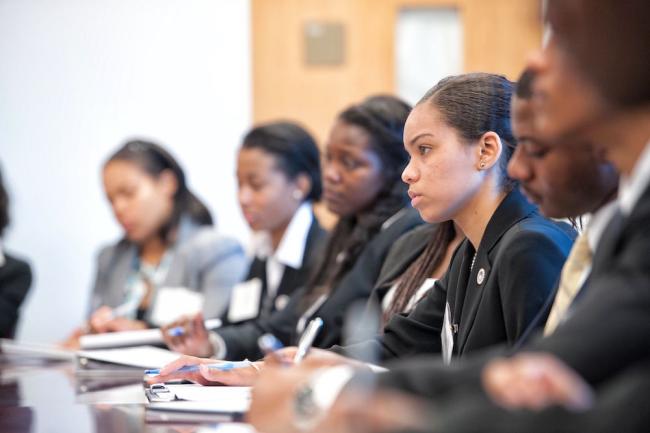By Brittany Bailer
The Criminal Justice Clinic at the Howard University School of Law announced the official launch of a new advocacy and litigation campaign dedicated to stopping and reversing the criminalization of hip-hop and rap culture by the criminal justice system. Howard Law Professor and Director of the Criminal Justice Clinic, Lucius T. Outlaw III, J.D., launched Culture Not Evidence: A Campaign Against the Criminalization of Hip-Hop to give students practical legal experience while addressing a contemporary issue at the intersection of race and the criminal justice system.
“The criminalization of hip-hop rests on the misunderstanding, fear, and devaluing of a vibrant and impactful piece of Black culture. Legal advocacy that educates and resists this criminalization is needed to force the legal system to respect hip-hop the same way it does other art forms,” said Outlaw.
Four third-year law students at the clinic worked on People of the State of California v. Ronnie Louvier in San Francisco and are making headway in the case. Princess Jefferson, Stayce Evans, Kimberly Cioffi, and Crystal Burbage worked together to draft a motion for a new trial on behalf of the defendant Ronnie Louvier, also known as Ron Rugger, who was convicted of murder in 2008. His attorneys and racial justice advocates maintain that the conviction against him was tainted by racial bias and the improper use of rap lyrics in the case. After years of deeper investigations, compiling new evidence and numerous failed attempts at resentencing and getting a new trial, the students at the Criminal Justice Center will try once again to secure a new trial. Their motion will be heard today in the Superior Court of California in the county of San Francisco.
“It’s one thing to be an oral advocate, but I think people don’t understand the power of the pen when it comes to truly being an advocate for your client. You have to be able to explain why your argument deserves a favorable outcome, particularly when there isn’t much supporting case law or research, and working on this case taught me that,” said Jefferson.
Clinic students also worked on the highly publicized YSL Racketeer Influenced and Corrupt Organizations (RICO) case in Atlanta. In the YSL RICO case, Howard Law students consulted with the lead defense attorney for rapper Young Thug, whose legal name is Jeffrey Williams, to develop arguments against the use of his lyrics as evidence. The court ultimately decided that lyrics were admissible if they reached certain standards.
Culture Not Evidence aims to advance racial justice within the criminal system by promoting the protection of hip-hop as artistic expression. Judges and juries must recognize hip-hop/rap as artistic expression that is deserving of the same protections, considerations, and respect given to other music genres and art forms.
To bring about this judicial recognition, students involved in the project develop resources for defense attorneys, including those testifying as experts, to educate judges and juries about the history, complex nature, poetic structures, lyrical stylings, and musical intricacies of hip-hop/rap, as well as the market and music industry pressures and influences on the genre.
“This campaign allows clinic students to apply their legal education and training to challenge the government’s use of an artistic expression that occupies a revered space in the students’ identity and life experience, honor the history and mission of Howard Law School, and give Howard Law a voice in an important civil rights and criminal justice conversation,” said Outlaw.

